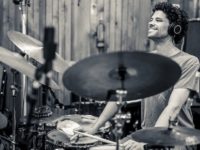Samantha Boshnack once again makes music with a purpose, but also with a whole new vessel for carrying it out. Live In Santa Monica heralds a new combo for this trumpeter, bandleader and composer to coincide with this new theme.
Boshnack is intrigued by the ‘Ring of Fire’ coastlines that circle up from Chile to Alaska and down past Japan and into Polynesia. This horseshoe-shaped string of volcanoes and sites of seismic activity around the edges of the Pacific Ocean account for about 90% of all earthquakes with 75% of all active volcanoes on Earth. These sites of geographical drama underscore both the Earth’s mind-boggling beauty and calamity. Boshnack’s complex, episodic style of composition is a great fit for the equally complex and episodic subject matter, which she crafted into a whole set of works themed on this terrestrial phenomenon.
Live In Santa Monica not only presents this set of themed compositions, but introduces the aforementioned new combo to carry it out: Samantha Boshnack’s Seismic Belt. Joining Boshnack is Ryan Parrish on saxophones, Paul Cornish on piano, Dan Schnelle on drums, Nashir Janmohamed on acoustic bass and a small string section consisting of Lauren Elizabeth Baba (violin, viola) and Paris Hurley (violin). The participation of string players bridges the chamber jazz ambitions of Boshnack’s fourteen-member strong B’shnorkestra and the immediacy and agility of her Sam Boshnack Quintet.
The works were taped in 2018 during a live performance at the Crossroads School for the Arts and Sciences and was commissioned by the Make Jazz Fellowship. This setting in front of a patient but appreciative audience and with some rather good acoustics was the right combination to combine both the best attributes of a studio and live recording.
“Subduction Zone” features competing harmonic ideas and during her solo it’s clear that Samantha Boshnack’s got a vocabulary on the trumpet that’s all hers. Baba’s viola run is no less eccentric, the nearest influence detected being the innovative, daring violist Mat Maneri. “Kamchatka” (video above) begins with a bedrock established by Schnelle’s discerning patter and Hurley and Baba playing the main harmonic pattern as Boshnack and Parrish state the theme, all in a unusual time signature that collectively suggests non-Western music forms playing a large hand in shaping this melody. Baba takes the first solo, which is really two of them: first by plucking her violin and then bowing it; both are done sublimely.
Boshnack combines with the two string players for a chamber setting intro on “Tectonic Plates” before the band launches into one of her serpentine melodies and Parrish is given the floor to improvise tastefully with a baritone sax. Cornish’s solo is accompanied by very sympathetic drumming from Schnelle, effectively making it a two-man solo.
For the first half of “Summer That Never Comes” Hurley headlines a funky procession, with strong support from the Cornish/Janmohamed/Schnelle rhythm section. Samantha Boshnack leaves some moody voicings in the second half. The duality of the composition portrays the eruption of Iceland’s volcano in 1783 and the cold pall it cast on much of the world for the following year.
Parrish on tenor sax puts in a soulful performance during “Convection Current,” followed by Cornish’s strong outing. “Choro” divulges South American influences, appropriate for a song about volcanically-active Chile, and the composer herself takes charge with a trumpet feature that’s imbibed with the rich musical heritage of the region.
The intertwined violins of Baba and Hurley introduce the Japanese folk stylings of “Fuji,” continued by Cornish and complemented with an august rendering from Boshnack and Parrish. But just as quickly as the piece swells, it recedes again to set the stage for Cornish’s unusually densifying piano. Janmohamed gets time all by himself and takes advantage with a meditative bass soliloquy. But in a Boshnack song, nothing stays in place and the performance culminates into some — shall I say it? — volcanic drumming.
“Submarine Volcano” is relatively subdued but also the most balletic song, showing how gracefully the band can traverse through a meticulous piece.
A Samantha Boshnack project is always an ambitious project. This time, she takes her ambitions to the next level and then puts it all on the line with a new band in front of a live audience. No sweat.
Live In Santa Monica is set to drop on March 15, 2019 from Orenda Records.
- Ches Smith Quartet – ‘Clone Row’ (2025) - May 30, 2025
- James Brandon Lewis Quartet – ‘Abstraction Is Deliverance’ (2025) - May 27, 2025
- Soft Machine – ‘Drop’ (1971, 2025 remaster) - May 21, 2025




